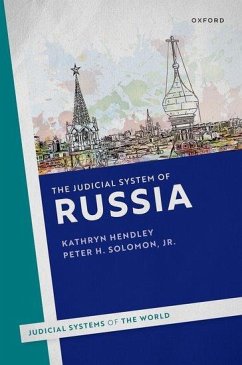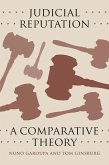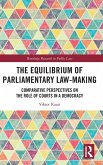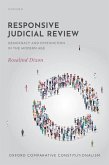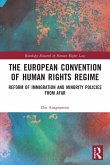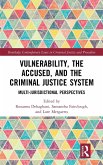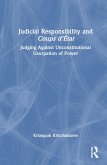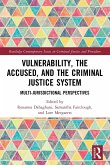Prof Kathryn Hendley (Roman Z. Livshits and Theodore W. Brazeau Pro, Solomon, Jr., Prof Peter H. (Emeritus Professor of Political Science
The Judicial System of Russia
Prof Kathryn Hendley (Roman Z. Livshits and Theodore W. Brazeau Pro, Solomon, Jr., Prof Peter H. (Emeritus Professor of Political Science
The Judicial System of Russia
- Broschiertes Buch
- Merkliste
- Auf die Merkliste
- Bewerten Bewerten
- Teilen
- Produkt teilen
- Produkterinnerung
- Produkterinnerung
This book paints a portrait of the courts of the Russian Federation under Putin. It stresses the dual nature of a judicial system where ordinary cases are handled fairly, but where cases of interest to powerful persons are subject to influence. A must read for those with an interest in Russia's judicial systems.
Andere Kunden interessierten sich auch für
![Judicial Reputation Judicial Reputation]() Nuno GaroupaJudicial Reputation33,99 €
Nuno GaroupaJudicial Reputation33,99 €![The Equilibrium of Parliamentary Law-Making The Equilibrium of Parliamentary Law-Making]() Viktor KazaiThe Equilibrium of Parliamentary Law-Making137,99 €
Viktor KazaiThe Equilibrium of Parliamentary Law-Making137,99 €![Responsive Judicial Review Responsive Judicial Review]() Rosalind Dixon (Scientia Professor of La Scientia Professor of LawResponsive Judicial Review126,99 €
Rosalind Dixon (Scientia Professor of La Scientia Professor of LawResponsive Judicial Review126,99 €![The European Convention of Human Rights Regime The European Convention of Human Rights Regime]() Dia AnagnostouThe European Convention of Human Rights Regime42,99 €
Dia AnagnostouThe European Convention of Human Rights Regime42,99 €![Vulnerability, the Accused, and the Criminal Justice System Vulnerability, the Accused, and the Criminal Justice System]() Vulnerability, the Accused, and the Criminal Justice System147,99 €
Vulnerability, the Accused, and the Criminal Justice System147,99 €![Judicial Responsibility and Coups d'État Judicial Responsibility and Coups d'État]() Kriangsak KittichaisareeJudicial Responsibility and Coups d'État164,99 €
Kriangsak KittichaisareeJudicial Responsibility and Coups d'État164,99 €![Vulnerability, the Accused, and the Criminal Justice System Vulnerability, the Accused, and the Criminal Justice System]() Vulnerability, the Accused, and the Criminal Justice System50,99 €
Vulnerability, the Accused, and the Criminal Justice System50,99 €-
-
-
This book paints a portrait of the courts of the Russian Federation under Putin. It stresses the dual nature of a judicial system where ordinary cases are handled fairly, but where cases of interest to powerful persons are subject to influence. A must read for those with an interest in Russia's judicial systems.
Produktdetails
- Produktdetails
- Judicial Systems of the World
- Verlag: Oxford University Press
- Seitenzahl: 272
- Erscheinungstermin: 21. März 2024
- Englisch
- Abmessung: 231mm x 153mm x 18mm
- Gewicht: 424g
- ISBN-13: 9780198875246
- ISBN-10: 019887524X
- Artikelnr.: 67864728
- Herstellerkennzeichnung
- Libri GmbH
- Europaallee 1
- 36244 Bad Hersfeld
- gpsr@libri.de
- Judicial Systems of the World
- Verlag: Oxford University Press
- Seitenzahl: 272
- Erscheinungstermin: 21. März 2024
- Englisch
- Abmessung: 231mm x 153mm x 18mm
- Gewicht: 424g
- ISBN-13: 9780198875246
- ISBN-10: 019887524X
- Artikelnr.: 67864728
- Herstellerkennzeichnung
- Libri GmbH
- Europaallee 1
- 36244 Bad Hersfeld
- gpsr@libri.de
Kathryn Hendley is Professor of Law and Political Science at the University of Wisconsin-Madison. Her research documents the dualistic nature of the Russian legal system and the willingness of Russians (both individuals and entities) to take routine disputes to their courts. She has carried out ethnographic research in Russia's arbitrazh and justice-of-the-peace courts and was the first to field a survey of Russian lawyers that included all specialties. Her work has been funded by Fulbright, the NSF, the World Bank, and others, and has been published in major social science journals. Peter H. Solomon, Jr. is Emeritus Professor of Political Science, Law and Criminology at the University of Toronto and Member of its Centre for European, Russian, and Eurasian Studies at the Munk School of Global Affairs and Public Policy. He has written extensively on the history of courts and criminal justice in the USSR and its successor states. His research is currently focused on judicial reform in Russia and Ukraine, where he has participated in projects with the World Bank, OSCE, and the Canadian International Development Agency), as well as on criminal law, procedure, and justice in authoritarian and transitional states.
PART ONE: Historical Perspectives
1: Legacies from the Past: Tsarism and the Soviet Experience
2: The (Re)Making of Courts and Judicial Governance, 1988-2021
PART TWO: People, Attitudes, Politics
3: Judges and the Judiciary: Recruitment, Discipline, Careers
4: Lawyers: Training and Role in the Courts
5: Public Attitudes Towards Courts and the Use of Courts
6: Cases with Outside or Inappropriate Influence
PART THREE: The Administration of Justice or Courts in Action
7: Justice-of-the-Peace Courts and Everyday Law
8: The Administration of Criminal Justice
9: Civil Justice
10: The Arbitrazh Courts and Business Disputes
11: Constitutional and Administrative Justice
1: Legacies from the Past: Tsarism and the Soviet Experience
2: The (Re)Making of Courts and Judicial Governance, 1988-2021
PART TWO: People, Attitudes, Politics
3: Judges and the Judiciary: Recruitment, Discipline, Careers
4: Lawyers: Training and Role in the Courts
5: Public Attitudes Towards Courts and the Use of Courts
6: Cases with Outside or Inappropriate Influence
PART THREE: The Administration of Justice or Courts in Action
7: Justice-of-the-Peace Courts and Everyday Law
8: The Administration of Criminal Justice
9: Civil Justice
10: The Arbitrazh Courts and Business Disputes
11: Constitutional and Administrative Justice
PART ONE: Historical Perspectives
1: Legacies from the Past: Tsarism and the Soviet Experience
2: The (Re)Making of Courts and Judicial Governance, 1988-2021
PART TWO: People, Attitudes, Politics
3: Judges and the Judiciary: Recruitment, Discipline, Careers
4: Lawyers: Training and Role in the Courts
5: Public Attitudes Towards Courts and the Use of Courts
6: Cases with Outside or Inappropriate Influence
PART THREE: The Administration of Justice or Courts in Action
7: Justice-of-the-Peace Courts and Everyday Law
8: The Administration of Criminal Justice
9: Civil Justice
10: The Arbitrazh Courts and Business Disputes
11: Constitutional and Administrative Justice
1: Legacies from the Past: Tsarism and the Soviet Experience
2: The (Re)Making of Courts and Judicial Governance, 1988-2021
PART TWO: People, Attitudes, Politics
3: Judges and the Judiciary: Recruitment, Discipline, Careers
4: Lawyers: Training and Role in the Courts
5: Public Attitudes Towards Courts and the Use of Courts
6: Cases with Outside or Inappropriate Influence
PART THREE: The Administration of Justice or Courts in Action
7: Justice-of-the-Peace Courts and Everyday Law
8: The Administration of Criminal Justice
9: Civil Justice
10: The Arbitrazh Courts and Business Disputes
11: Constitutional and Administrative Justice

